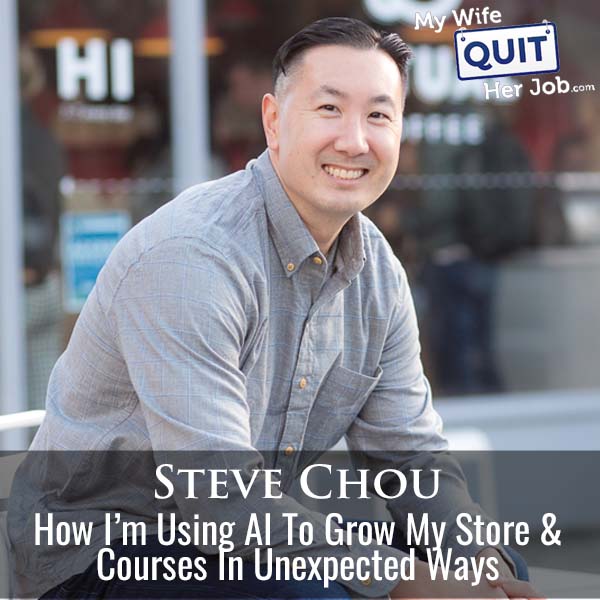602: How I’m Using AI To Grow My Store And Courses In Unexpected Ways

```html E-Commerce Entrepreneur Leverages AI to Boost Online Sales
Steve Chou, the entrepreneur behind MyWifeQuitHerJob.com and Bumble Bee Linens, is reporting significant revenue gains by integrating artificial intelligence (AI) into his e-commerce operations. Chou's recent podcast detailed how AI-powered enhancements to his online store have led to an immediate lift in sales, with early data suggesting a potential long-term increase of 10-20%.
AI-Driven Product Recommendations Fuel Growth
Chou's strategy focuses on improving product discovery and recommendations, mimicking features commonly found on larger e-commerce platforms like Amazon. By employing AI, he aims to provide a more personalized and intuitive shopping experience for his customers.
"Frequently Bought Together" Feature Enhanced
One key initiative involves enhancing the "frequently bought together" feature on Bumble Bee Linens. Previously, this feature was limited by a lack of sufficient sales data for many of the store's nearly 1,000 stock-keeping units (SKUs). To address this, Chou utilized AI to identify similar products based on image analysis, effectively populating the "bought with" section for a wider range of items.
AI-Powered Image Analysis
According to Chou, the AI analyzes product images, converts them into mathematical representations, and then compares them across the entire product catalog. This allows the system to identify visually similar items, even if they are not explicitly categorized as such. For example, if a customer is viewing a Battenberg lace handkerchief, the AI can identify and suggest other similar lace handkerchiefs, regardless of their specific product description.
Improved Onsite Search Functionality
Beyond product recommendations, Chou has also overhauled the onsite search functionality using AI. Recognizing that a significant percentage of searches previously yielded no results, often due to misspellings or the use of synonyms, he implemented an AI-powered search engine that understands the intent behind the query, even if it is not perfectly phrased.
“People cannot spell,” Chou noted in his podcast. “People use a whole bunch of weird synonyms that aren’t spelled correctly.”
To overcome this challenge, Chou used AI to generate detailed descriptions for each product, including potential use cases and target demographics. These descriptions are then indexed using a vector database, allowing the search engine to return relevant results even for poorly worded or misspelled queries.
Expert Perspective: The Democratization of E-Commerce Technology
Dr. Emily Carter, a professor of e-commerce and digital marketing at the University of California, Berkeley, believes that Chou's success highlights the increasing accessibility of advanced technologies for small and medium-sized businesses. "Historically, AI-powered features like personalized recommendations and semantic search were only within reach of large corporations with significant resources," she explains. "However, the emergence of affordable and user-friendly AI tools is leveling the playing field, enabling entrepreneurs like Steve Chou to compete more effectively."
Historical Context: The Evolution of E-Commerce Personalization
The concept of personalized product recommendations in e-commerce dates back to the early days of online retail. Amazon pioneered the use of collaborative filtering algorithms in the late 1990s, analyzing customer purchase history to suggest relevant products. Over time, these algorithms have become increasingly sophisticated, incorporating factors such as browsing behavior, product ratings, and social media data. AI-powered image recognition adds a new dimension to this, allowing for recommendations based on visual similarity, which is particularly relevant for products like clothing, accessories, and home goods.
Challenges and Considerations
While Chou reports promising results, he acknowledges that the initial sales lift may not be sustainable in the long term. He also cautions that the computational demands of AI-powered features can be significant, requiring careful optimization to avoid slowing down the website. The process of calculating product similarities and generating recommendations can be resource-intensive, particularly for stores with large product catalogs.
Chou addresses this by performing these calculations offline, updating the product recommendations and search index periodically rather than in real-time. This approach minimizes the impact on website performance but requires ongoing maintenance and monitoring.
Looking Ahead
Chou plans to continue experimenting with AI to further enhance the customer experience on Bumble Bee Linens. He intends to track the long-term impact of his AI-powered features and share his findings with other e-commerce entrepreneurs. The successful integration of AI into his business model suggests a promising future for smaller online retailers seeking to leverage advanced technologies to drive growth and improve customer satisfaction. ```
Originally sourced from: WifeQuitHer Job
